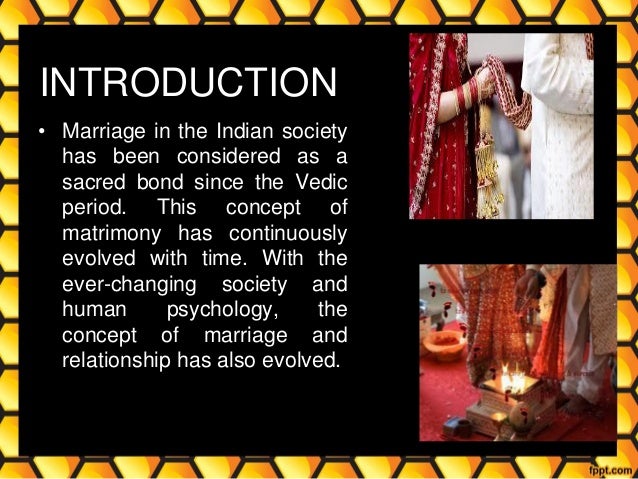Sociology:
- Systems of Kinship in India:
- Family and marriage in India.

India is a place where marriage is seen as a sacramental institution and hence a man and women if want to live together, have to get themselves tied in the institution of marriage. However, in the 21st century a new concept which is known as “live in relationship” has emerged. Live in Relationship is a concept under which a man and women live together without getting married. This concept in India is fairly new but is spreading rapidly. Various Supreme Court judgements have recognised the concept of live in relationship and has legalised it. It is to be noted that nowhere in the Hindu Marriage Act,1955 has recognised live in relationship and hence some people consider it as an illegitimate relationship. Live in relationship whether legal or illegal is very subjective especially in India where traditions are given utmost importance and violating them is considered as a sin.
Marriage in Indian Society
- In India traditionally marriage is a sacramental institution and the very essence of marriage is based on the principles of tolerance and responsibilities.
- People from generations have been following these principles and have considered it their duty to follow these principles when they get married.
- But as Indian society moved forward and become much more modern people started looking for an alternative to marriage as marriage according to the new generation youth is a burden and thus wanted something under which they can live like a married couple without any commitments, under these circumstances the concept of the live-in relationship seemed to be the savior.
- However, the concept of the live-in relationship had various side effects such as; whether these relationships are legal or whether pre-marital sex should be legalised in India, especially when marriage was an institute to legalise the sexual relationships.
- The most important issue that arose was that what would happen to children born out of these relationships.
- One thing to be noted is that the practice of live-in relationships is widely practiced in urban India especially in metropolitan cities.
- The society is divided as to whether live in a relationship should be practiced or not.
- On one hand, there are people who think that marriage is a sacrament and thus is necessary for legalising sexual relationship between a man and women, they allege that live in relationship destroy the social fabric of the society and thus it would create confusion and hence should not be recognised.
- The other side favours this concept and advocates that we live in 21stCentury and hence youngsters should be given the freedom to choose their partners and thus they should decide whether they are compatible enough to enter into a sacred institution like marriage.
What is Live in Relationship and its Legality
Live-in Relationship is a relationship which does not create any rights and responsibilities that a perfectly valid marriage creates. Neither the man is bound to maintain the women nor the women have any kind of responsibility towards the man. It can be defined as a walk-in and walk-out relationship. Both the individuals with each other’s consent live together not because they are married but because they want to live together. The big question arises is this kind of relationship recognised. The answer is yes although live-in relationship is not recognised in any statute or any other government legislation. But the Supreme court of India through various judgement has given live in relationship a legal backing.
- For the first time, the question of whether live-in relationship is a legal relationship came to the supreme court in the case of Badri Prasad v. Dy. Director of Consolidation.
- In the present case the parties were living in a live in relationship for almost 50 years and the question before the court was whether their relationship be granted the same status which is granted to a married couple and the apex court’s decision was in favour of the couple and the apex court granted legal status to their 50 year relationship.
- In the case ofIndra Sarma v. VKV Sarma the Supreme Court held that if at any point any male who is not married lives with a women who is also not married and they also shared the same house then that will come under section 2(f) of Domestic Violence Act and if at any point of time domestic violence occurs then the aggrieved person can seek relief under the chapter IV of the Domestic Violence Act.
Moral and Social Issues Related to Live in Relationships
- In India marriage as above mentioned is a sacrament however it is very difficult to trace the origin of marriage, under Hindu rites and traditional marriage is a concept that started as soon as the man came into being.
- The main purpose of marriage was to give legitimacy to the sexual relationship between man and women and second the child born out of that marriage will be a legitimate child.
- Under Indian Society the concept of marriage is so deeply engrossed that if any two people of opposite sex either engage in sexual relationship without getting married it is considered as a taboo and hence those couple have to face the crunch of the society, marriages in India is not only the tie up of men and women but also a tie up of the families and therefore a great degree of caution is taken care when two people are getting married, but when two individual of opposite sex live together in live in relationship the society not only doubt their character but also start questioning their family upbringing and hence parents sometimes are also not supported for live in relationship.
- However, things are changing in metropolitan cities like Bangalore, Delhi, Mumbai, and Chennai people are accepting live-in relationship as a legitimate form of relationship, but in rural India, the situation is not the same. People in rural India do not have a positive outlook towards live in a relationship.
- In contrast in western societies’ marriages are seen as an individual choice rather than a family decision and hence individual liberty is more than in Indian society.
- Many people in India believe that live in relationships are just a way to fulfill the sexual desires and hence it is the same as prostitution, however this kind of mindset needs social conditioning and people need to understand that people do not go for live in relationship just because they want to fulfill their sexual desires but the major reason behind opting for live in relationship is that before marriage both the couple want to see whether they are compatible with each other, this is good in the sense that marriage is a lifelong relationship and before entering into that sacred relationship everyone has the right to decide whether his or her partner is perfect or not.
- Another problem that the Indian society attaches with live in relationships is that it makes a man and women shrug away from their responsibilities and hence make them careless, many conservatives are of the view that live in relationship is a bad influence on the Indian society by the western world.
- This kind of mentality needs a rethinking as society accepts only those influences with which the people are comfortable and if it is not harmful.
- Individual liberty and freedom are the essences of democracy and hence these two principals must be respected in any democratic society.
- Thankfully the new generations are much more open-minded and are broad-minded when it comes to live in relationships and they have released that societal restriction must not harm the individual freedom and it must be left to the individual themselves to decide which practice is harmful to them and which are not.
Whether live in relationship is a substitute of Marriage?
- The big question that arises is that whether the Indian Society is ready to accept Live in relationship as a substitute of Marriage, the Supreme court in the case of Badri Prasad v. Dy. Director of Consolidation granted a legal status to the couple who lived-in live-in relationship for almost 50 years.
- Therefore, one thing which must be taken into consideration while granting a legal status to a live-in relationship is that the couple should be living together for some reasonable period of time.
- it is obvious that marriage and living together are two different things, not every time a live-in couple will end up marrying each other and hence these two concepts cannot be mixed with each other.
- Live in relationship as discoursed above is a very recent development in the Indian context and therefore it would not be completely accepted in one go and that in one way is completely fine, live in relationship is a western concept and hence it becomes more important to analyse the both sides of the coin before reaching to a conclusion, as of now the Indian Society does not grant the same position to live in couples than married couples and therefore even in 21stcentury a couple who is married is given more respect in the society than a couple who is not married.
- One big issue that is associated with live in couples is that what would happen to the children who are born out of live in relationship, as per Hindu Marriage Act,1955 children born out before marriages are considered to be the legitimate children of their parents, however the problem arises when the couple decide to live apart and none of the parent is keen to take responsibility of the child, in that situation the court or the legislators must ensure that one of the parent must take the responsibility of the child, for securing the rights of the child the court must appoint a guardian, and the child must get all the rights to take in the property of his father as well as his mother.
- In the case of Bharata Matha it was held by the Supreme Court that a child born out of live in relationship is a legitimate child and he has the right to access the property of his parents excluding the ancestral undivided property.
- With all these issues it can be said that practically live in Relationships cannot be a substitute of marriage, however, it can be an alternative to marriage as if the couple are eager to live together but not get tied in marital responsibilities then it is completely fine if they go for live in relationship.
- The question that arises is whether live-in relationships be recognised by the government and if yes why not make a law on it.
- Former Union Law Minister Mr. H.R. Bharadwaj in 2008 showed interest in the making legislation for legalising live-in relationships and proposed that if the society is ready for it then the government has no problem making a law on it, however no such concreate steps have been taken to further the issue.
Conclusion
When it comes to marriage in India traditions have been given utmost importance and therefore any deviance from any tradition is considered to be a sin in Indian Society.
The concept of live in relationship is totally opposite to the concept of marriage, the main reason why men and women enter into marital ties is to secure each other and to support each other, although in live in relationship couple are living together because they love each other the degree of security that is present in marriages is not present in live in relationship.
Indian people are conditioned to those tradition and values and therefore it would be wrong to judge those people who oppose the concept of live in relationship.
Change in society takes place gradually and hence change should be gradual and not sudden. The concept of live in relationship is taken from the western world and hence it will bring rational thinking and make people more open-minded and encourage them to think broadly.
In a way live in relationships are beneficial to the society especially to the Indian Society as live in couple spend a lot of time together before getting married and hence it is logical that a partner whom a person wants to spend his entire life must be able to know him or her completely, especially in India where the cases of divorce are on a rise. In spite of the fact that live-in relationships are highly recognised in the western countries it still remains under the social lock mainly due to the Hindu Dharma as in Hindu Dharma marriage is seen as an eternal union that cannot be broken and hence if once married you remain together for seven generation.
However, live in relationships as per some Hindu philosophers is unrighteous and should not be practised, however, it should be realised that the if anyone wants to live together as per their wishes they should be given that much liberty to do that in a democratic setup and those couples must not be victimised.
it is appreciable that the judiciary through various pronouncements have given legitimacy to the live in couple which is again a welcoming step and the fact that the young generation of India are thinking rationally and are open minded in matters like these is a positive sign.



I have updated my knowledge after reading the information given on your site, thank you so much for such an awesome article.